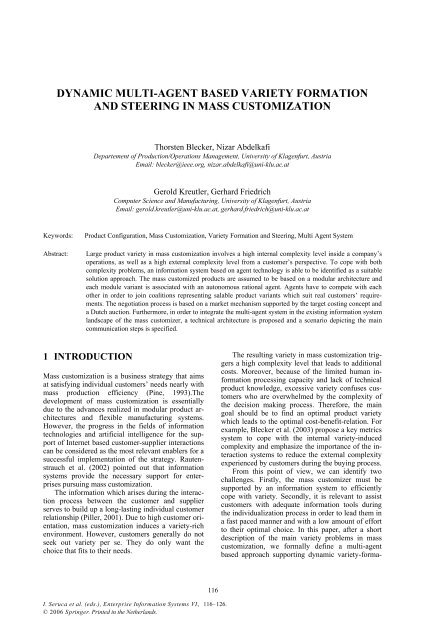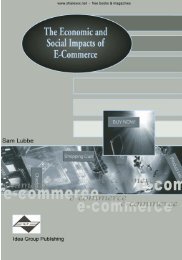Back Room Front Room 2
Back Room Front Room 2
Back Room Front Room 2
Create successful ePaper yourself
Turn your PDF publications into a flip-book with our unique Google optimized e-Paper software.
DYNAMIC MULTI-AGENT BASED VARIETY FORMATION<br />
AND STEERING IN MASS CUSTOMIZATION<br />
Thorsten Blecker, Nizar Abdelkafi<br />
Departement of Production/Operations Management, University of Klagenfurt, Austria<br />
Email: blecker@ieee.org, nizar.abdelkafi@uni-klu.ac.at<br />
Gerold Kreutler, Gerhard Friedrich<br />
Computer Science and Manufacturing, University of Klagenfurt, Austria<br />
Email: gerold.kreutler@uni-klu.ac.at, gerhard.friedrich@uni-klu.ac.at<br />
Keywords: Product Configuration, Mass Customization, Variety Formation and Steering, Multi Agent System<br />
Abstract: Large product variety in mass customization involves a high internal complexity level inside a company’s<br />
operations, as well as a high external complexity level from a customer’s perspective. To cope with both<br />
complexity problems, an information system based on agent technology is able to be identified as a suitable<br />
solution approach. The mass customized products are assumed to be based on a modular architecture and<br />
each module variant is associated with an autonomous rational agent. Agents have to compete with each<br />
other in order to join coalitions representing salable product variants which suit real customers’ requirements.<br />
The negotiation process is based on a market mechanism supported by the target costing concept and<br />
a Dutch auction. Furthermore, in order to integrate the multi-agent system in the existing information system<br />
landscape of the mass customizer, a technical architecture is proposed and a scenario depicting the main<br />
communication steps is specified.<br />
1 INTRODUCTION<br />
Mass customization is a business strategy that aims<br />
at satisfying individual customers’ needs nearly with<br />
mass production efficiency (Pine, 1993).The<br />
development of mass customization is essentially<br />
due to the advances realized in modular product architectures<br />
and flexible manufacturing systems.<br />
However, the progress in the fields of information<br />
technologies and artificial intelligence for the support<br />
of Internet based customer-supplier interactions<br />
can be considered as the most relevant enablers for a<br />
successful implementation of the strategy. Rautenstrauch<br />
et al. (2002) pointed out that information<br />
systems provide the necessary support for enterprises<br />
pursuing mass customization.<br />
The information which arises during the interaction<br />
process between the customer and supplier<br />
serves to build up a long-lasting individual customer<br />
relationship (Piller, 2001). Due to high customer orientation,<br />
mass customization induces a variety-rich<br />
environment. However, customers generally do not<br />
seek out variety per se. They do only want the<br />
choice that fits to their needs.<br />
I. Seruca et al. (eds.), Enterprise Information Systems VI,<br />
© 2006 Springer. Printed in the Netherlands.<br />
116<br />
116–126.<br />
The resulting variety in mass customization triggers<br />
a high complexity level that leads to additional<br />
costs. Moreover, because of the limited human information<br />
processing capacity and lack of technical<br />
product knowledge, excessive variety confuses customers<br />
who are overwhelmed by the complexity of<br />
the decision making process. Therefore, the main<br />
goal should be to find an optimal product variety<br />
which leads to the optimal cost-benefit-relation. For<br />
example, Blecker et al. (2003) propose a key metrics<br />
system to cope with the internal variety-induced<br />
complexity and emphasize the importance of the interaction<br />
systems to reduce the external complexity<br />
experienced by customers during the buying process.<br />
From this point of view, we can identify two<br />
challenges. Firstly, the mass customizer must be<br />
supported by an information system to efficiently<br />
cope with variety. Secondly, it is relevant to assist<br />
customers with adequate information tools during<br />
the individualization process in order to lead them in<br />
a fast paced manner and with a low amount of effort<br />
to their optimal choice. In this paper, after a short<br />
description of the main variety problems in mass<br />
customization, we formally define a multi-agent<br />
based approach supporting dynamic variety-forma-









